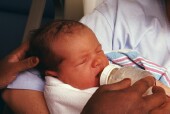- Could Your Grocery Store Meat Be Causing Recurring UTIs?
- Are You Making This Expensive Thermostat Error This Winter?
- Recognizing the Signs of Hypothyroidism
- 10 Strategies to Overcome Insomnia
- Could Artificial Sweeteners Be Aging the Brain Faster?
- Techniques for Soothing Your Nervous System
- Does the Water in Your House Smell Funny? Here’s Why
- Can a Daily Dose of Apple Cider Vinegar Actually Aid Weight Loss?
- 6 Health Beverages That Can Actually Spike Your Blood Sugar
- Treatment Options for Social Anxiety Disorder
Breast Milk Bought Online Might Contain Cow’s Milk, Study Finds


Parents who buy breast milk online may not always get 100 percent human milk. A new study found about 10 percent of samples tested were contaminated with cow’s milk.
“Human milk may be purposely ‘topped off’ with cow’s milk or infant formula, and this could be harmful to babies receiving the purchased milk if they have cow’s milk allergy or intolerance,” said lead author Sarah Keim, a researcher at Nationwide Children’s Hospital in Columbus, Ohio.
“For other babies, cow’s milk is not recommended as a primary source of nutrition because it does not provide complete nutrition for human infants,” Keim said.
For the study, published online April 6 in the journal Pediatrics, researchers bought 102 samples of advertised human milk online and tested the DNA in each one. They found that 10 samples contained at least 10 percent of cow’s milk.
The study authors noted that earning money for breast milk might motivate sellers to add cow’s milk to increase their milk volume, but buyers cannot usually test the milk.
“There really is no way a parent can tell if the milk they buy online is safe and high-quality,” Keim said. “Given the risks, it is not a good idea to feed your baby milk you purchase online.”
In a previous study, Keim and her colleagues found that breast milk samples bought online contained potentially harmful levels of bacteria and tested positive for a virus called cytomegalovirus.
Kim Updegrove, president of the Human Milk Banking Association of North America, said purchasing milk outside of standardized human milk banks is risky.
“When you have monetary incentive and you have women who may be desperate or may not know any better, you have a risk of getting something along with the milk you are purchasing,” she said.
“It is important to applaud parents who want to do what’s best for their babies, but to remind them that it’s a body fluid, and body fluids can be dangerous,” Updegrove said.
Besides cytomegalovirus, breast milk purchased online may contain viruses such as hepatitis B, hepatitis C and HIV, said Dr. Susan Landers, a neonatologist in Austin, Texas. Breast milk donations at regulated milk banks are tested for these viruses, and rejected if they test positive.
Further, buyers have no way to confirm the possible legal or illegal drug use of a mother selling milk online, Landers said.
“You have no idea about drug use, then there’s this willy-nilly bacterial contamination and concerns about temperature stability, and now they’re diluting it with cow’s milk,” Landers said.
While safer, milk from milk banks is usually only available to sick or fragile infants. Those first in line are premature infants in the neonatal intensive care unit, followed by newborns with congenital bowel or gastrointestinal disorders.
Babies born to HIV-positive mothers or mothers who have had a mastectomy also might qualify for milk-bank human milk. Some mothers who cannot breast-feed but have a healthy infant may be able to purchase milk from a bank with a doctor’s prescription, Landers said, but many banks can’t meet the current demand for infants who qualify for the milk.
The reasons parents might purchase milk online vary, the experts said. Children may be adopted, or a mother may have experienced lactation failure — the inability to breast-feed.
“Some mothers seem to be willing to go to extremes to get human milk for their baby and avoid feeding formula at all costs, to the extent they are willing to buy milk from an unfamiliar source,” Keim said.
But this is the riskier choice, Updegrove said. The U.S. Food and Drug Administration has issued warnings that purchasing human milk online is unsafe, but the agency has not outlawed the practice, something Updegrove and Landers expect will eventually happen.
Women may also purchase breast milk online because they wanted to breast-feed but did not receive sufficient support, the experts said.
“For women who want to breast-feed their infant, timely and high-quality lactation support is really important,” Keim said. “Unfortunately this is not always available, and more needs to be done to improve this in the U.S.”
More information
Womenshealth.gov talks about breast-feeding challenges.
Source: HealthDay
Copyright © 2026 HealthDay. All rights reserved.










